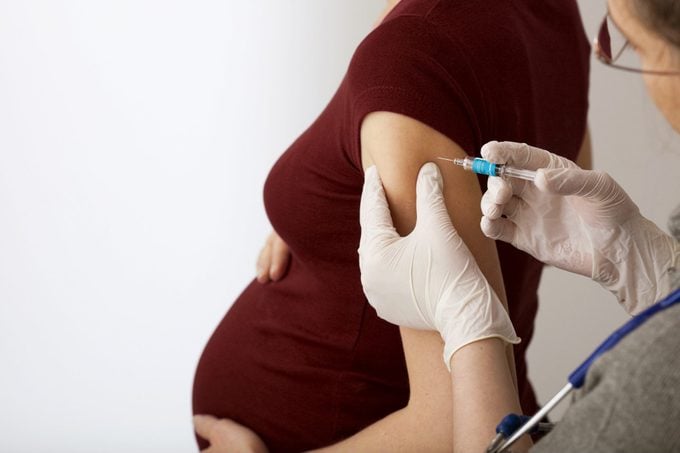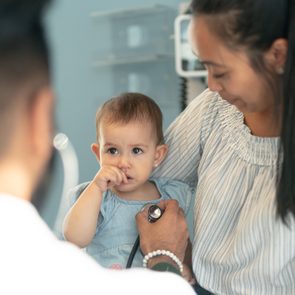6 Things to Know About the Tdap Vaccine in Pregnancy
Updated: Aug. 21, 2023
Newborns can't get the whooping cough vaccine. Getting the Tdap vaccine during pregnancy is one of the best ways to keep babies safe from this potentially life-threatening infection.
Why should you get the Tdap vaccine during pregnancy?
Once upon a time, pertussis—the disease known as whooping cough—was a much-dreaded and common diagnosis.
The creation of a vaccine in 1914 drastically cut rates of the disease from upwards of 200,000 a year to fewer than 30,000 annually in the United States.
But because babies aren’t fully vaccinated from pertussis until they’re at least six months old, they still represent 10 percent of all U.S. pertussis cases. They’re also more likely to be hospitalized and to die from whooping cough.
So what’s the best way to protect babies during this crucial window in time? That’s where vaccinations during pregnancy can make a big difference.
Here’s everything you need to know about the pertussis vaccine in pregnancy.
(Learn about diseases you didn’t know still existed.)
What is pertussis?
Pertussis is an infectious disease caused by a bacterium called Bordetella pertussis.
Once inside your body, the organism releases toxins that paralyze the tiny, hairlike cilia lining your respiratory tract. This leads to swelling and the hallmark symptom: a chronic cough.
After each coughing fit, patients gasp for air, which is what produces the classic “whoop” sound, explains Dennis Cunningham, MD, system medical director of infection control and prevention at Henry Ford Health System in Detroit.
This isn’t some there-and-gone disease. Whooping cough symptoms can last for months. The coughing fits can be so severe, they can cause people to vomit, pass out, crack ribs, or break small blood vessels in the face or eyes.
Pertussis in babies
Pertussis can affect all ages, but babies and infants suffer the most. Not only are they more likely to be infected, but they can actually stop breathing and develop brain disease.
About a quarter of babies who need to go to the hospital for whooping cough develop pneumonia. As many as 2 percent will die.
(This family lost their baby to whooping cough at just one month of age.)
About the vaccine
There are actually two vaccines for pertussis: DTaP and Tdap.
The DTap vaccine includes vaccines not just for pertussis (the P in the acronym) but also for diphtheria and tetanus. It’s given to children and infants under the age of 7.
Tdap contains the same three vaccines but at different strengths. Anyone age 7 and older, including people who are pregnant, can get this booster shot.
Babies get DTaP in a series of five doses, the first at 2 months of age, followed at 4 months, 6 months, 15 to 18 months, and, finally, 4 to 6 years.
Kids get a booster shot of Tdap between the ages of 11 and 12, then every 10 years thereafter. The same goes for adults.
“Vaccination is important at any age because immunity is not lifelong,” says Tina Q. Tan, MD, a spokesperson for the American Academy of Pediatrics. “Even if you get the disease, you don’t always develop great immunity.”
The current acellular version of the pertussis vaccine (the “a” in Tdap stands for “acellular”) only uses inactivated toxins from the bacterium for immunization.
Prior to 1996, the vaccine contained an inactivated version of the entire bacterium. However, this sometimes caused side effects in babies such as high fever, crying, and sudden limpness.

The vaccine and pregnancy
Full immunity for pertussis doesn’t kick in until the third shot, which means infants are vulnerable until that time. That’s one of the main reasons why parents need to be up to date on immunizations. Without them, they risk passing an infection on to their baby.
In 2012, the Advisory Committee on Immunization Practices recommended that people receive a Tdap vaccine every single time they get pregnant, even if the pregnancies are close together.
“Moms are the primary source of transmission to young infants,” explains Dr. Tan, who is also an infectious diseases specialist and professor of pediatrics at Northwestern University Feinberg School of Medicine in Chicago.
If a person is vaccinated during pregnancy, they can pass protective antibodies to the baby, which helps protect the newborn until they are able to get their own vaccine.
“The premise behind giving the vaccine during pregnancy is so that moms are able to transmit the antibodies against pertussis to the baby,” she says. “This will protect the baby for the first few months of life.”
According to the Centers for Disease Control and Prevention, Tdap vaccinations during pregnancy reduce the chances a baby will get whooping cough by 78 percent and reduces hospitalizations by 91 percent.
Linda Yancey, MD, an infectious diseases specialist at Memorial Hermann Hospital, does advise caution even if you do get the vaccine while pregnant.
“Getting vaccinated during pregnancy will increase your baby’s immunity, but it isn’t total protection so you should still keep your infant away from other sick children and/or areas where there are pertussis outbreaks,” she says. “In addition, the immunity passed from mother to child only lasts for a few months, shorter if the baby is not breastfed. Babies need to get the DTaP because after that time they will have no residual immunity and are at risk of disease and death.”
When should people who are pregnant get the vaccine?
To ensure your newborn gets the highest possible level of antibodies, officials recommend that people get the Tdap vaccine early during the third trimester of pregnancy (at 27 to 36 weeks).
This gives the immune system time to build up enough antibodies, which are then passed on to the baby.
If someone gets the vaccine earlier in pregnancy (perhaps because there was a disease outbreak or they needed tetanus protection because of a wound), they don’t need to get a second shot in the third trimester.
You can also get the shot after your baby is born, though protection won’t start right away.
(People who are pregnant are also advised to get the flu shot.)
Everyone in contact with the baby needs to be vaccinated
Experts also suggest that people who are going to spend time with the baby, like family members and caregivers, get the Tdap vaccine if they haven’t had it before.
Again, the best time is at least two weeks before visiting with the new arrival.
This is called cocooning: making sure the baby is safe by ensuring that everyone around him or her is immune.
If a family member or caretaker has already had the vaccine, there’s no need to repeat it with each pregnancy.
Tdap vaccine and autism risk
Studies show no connection between the vaccine and premature births or any other pregnancy problems or issues with the newborn baby.
Dr. Tan emphasizes that there is absolutely no link whatsoever to autism.
Autism is both a neurological and developmental disorder that can lead to challenges with interaction, communication, and learning. The condition tends to manifest during early childhood.
The notion that vaccines cause autism stems from a 1998 study published in The Lancet, which suggested that the measles, mumps, and rubella (MMR) vaccine, or being infected with the measles virus, may cause autism.
But here’s the important part: the study was later found to be inaccurate, and the medical journal retracted it.
Recent research also supports that vaccines, like Tdap, do not cause autism.
In a 2018 Pediatrics study of about 82,000 children born between 2011 and 2014 in Kaiser Permanente Southern California hospitals, researchers found that Tdap vaccine during pregnancy does not lead to a higher risk of autism in the vaccinated person’s children.
Compared with pregnant people who did not receive the vaccine, people who were vaccinated were no more likely to have children with autism.
Moreover, the researchers note the risk of autism appeared to be even lower in children exposed to Tdap in the womb (1.5 percent versus 1.8 percent).
The Tdap vaccine is safe
Although there may be mild side effects after the vaccination, like a sore arm, the DTaP and Tdap vaccines are safe for everybody over the age of 2 months.
In fact, the vaccine versions that have been used in the United States since 1996 (called acellular pertussis vaccines) have even fewer side effects than their predecessor.
The only caveat is that people who’ve had a severe allergic reaction to a previous vaccine need to take caution—and tell their doctor before getting the shot.
If you’ve had Guillain-Barré syndrome—a rare neurological disorder where your immune system attacks the nerves—or another neurological issue after a vaccine, talk to your doctor about whether or not you should get the vaccine.
Next, learn the things doctors wish you knew about vaccines.














